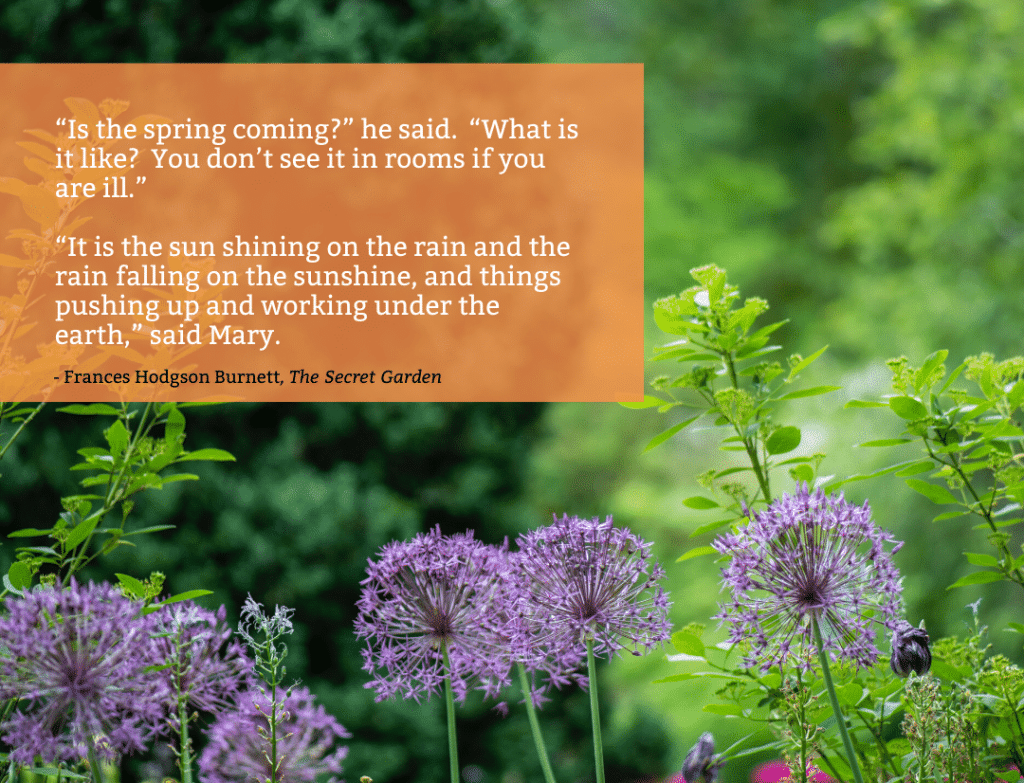By Heather Nash, Ph.D., Psychologist/Director, NAU Office of Employee Assistance and Wellness
I have lived in Flagstaff on and off since 1992, and I have seen crazy, challenging obstacles to gardening in the spring—wind, drought, flooding, snow in June, fires—and yet, each year I dream about what my garden might become. Thoughts of creating life, beauty and fresh food, being outside with my hands in the dirt and being able to enjoy beautiful flowers or a caprese salad made with homegrown tomatoes keep me invested in the dream. Some years, I have followed through with a garden, but I can never predict which plants will survive or thrive, and so every year, gardening has been a very different experience.
This year, as my husband and I plan our garden, I think about the unpredictability, stressors and potential obstacles we all face in other areas of our lives. Employee Assistance and Wellness (EAW) staff have compiled a list of common themes and worries we are hearing from NAU staff and faculty, as well as friends and family, including worry about basic physiological and/or safety needs, loneliness/feelings of isolation, relationship issues, overstimulation from media, boredom and grief/loss, to name a few. And so, as we tend our gardens and sow seeds despite the crazy Flagstaff spring, below are some tips for tending to our mental health and sowing seeds for personal growth during these stressful times. A great resource for fostering your own healthy foundation during this stressful time can be found here: Greater Good’s Guide to Wellbeing During Coronavirus.
Foster a healthy foundation
A solid, healthy foundation is crucial for addressing difficulties when they arise in the garden and in the mind. Good self-care is necessary (but not always sufficient) for managing obstacles. Just as plants need good soil, appropriate sun and water to thrive, we also need adequate nutrition, good sleep, regular exercise, appropriate medical care, relaxation and recreation. Managing stress levels helps foster resilience and creativity. For humans, this means engaging in coping skills like mindfulness, deep breathing, muscle relaxation and other various grounding techniques (e.g., humming, five senses exercise, etc.). It means setting appropriate boundaries for yourself and others and extending compassion to yourself and others. Planting the right seeds, or identifying and prioritizing our core values, gives us a roadmap for moving forward.
Build and maintain connections
Much research exists regarding mutually beneficial relationships in the natural world. In “Building your Resilience,” the American Psychological Association writes; “Connecting with empathetic and understanding people can remind you that you’re not alone in the midst of difficulties. Focus on finding trustworthy and compassionate individuals who validate your feelings, which will support the skill of resilience.” Reaching out to friends and family to support and be supported, engaging in fun family activities, trying out new parenting/other relationship strategies or engaging in random acts of kindness can positively impact mood and health, deepen connections and provide a sense of belonging for everyone involved. Thriving during stressful times is possible when you have an awesome support system!
A few weeks before we were married at our home last summer, I planted some monk’s hood and other flowers around my yard. The monk’s hood were still in the bud stage, and I worried they would not bloom before the big day. Then one morning, I was watering plants, and BOOM! There were the loveliest deep purple flowers I had seen in a long time, and the impact on my mood was immediate—I felt awe and joy, and it might have been all that was happening in my life, but I actually teared up. Recently, researchers have documented that awe is associated with numerous positive emotional and behavioral outcomes. Being out in nature is one way to inspire awe, for example, noticing “the sun shining on the rain and the rain falling on the sunshine,” but in a garden, we can create it. Similarly, we can engender awe when we can practice gratitude, learn something new, look for the silver lining in a situation, create or experience art, give to others or work on being present in this moment and truly observing it without judgment.
Foster positive activity in your garden
Weeds happen, and when they do, we have a choice to make: Do we continue to allow them to grow, or do we take steps to mitigate them? Negative thoughts are the weeds in this metaphor, and we have the power to take steps to manage our negative thoughts, but it requires the knowledge that they are there, alongside positive thoughts, “pushing up and working under the earth.” To mitigate negative thoughts, we can manage stressors that might be contributing to their intensity, like how much exposure to media and social media we allow ourselves. We can also manage expectations about what we “should” be, or what we would like to be, instead accepting our reality (for example, it would be amazing if my lilac bush flowered every spring, however, because of frost, I can expect lilac flowers every two to three years). And we can embrace change as an opportunity for growth, stay committed to values-based living within stressful situations, and work toward finding workable solutions to issues when they arise.
Finally, when I have really struggled in the past with gardening and have exhausted my resources, I have sought out experts, taking workshops and/or consulting with master gardeners. EAW is here to offer assistance to our NAU faculty and staff when you struggle with issues related to being a human. We continue to offer workshops, trainings, consultation and counseling via Zoom and over the telephone during this time. Please visit our website: nau.edu/eaw or call our office at (928) 523-1552 for more information.
May you stay healthy and take amazing care of yourselves and your families during this time. May your garden be stronger and more resilient on the other side.




